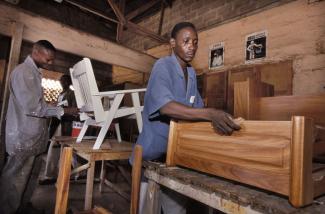Development finance
Africa’s private sector needs support

The research paper was prepared by scholars from leading think tanks as well as the UN Economic Commission for Africa on behalf of the Association of European Development Finance Institutions (EDFI). Among other things, EDFI wanted to know how its member organisations can – and should – support recovery. Put simply, the development finance institutions (DFIs) are government agencies that function like investment funds and have the mandate of supporting the private sector.
The report finds that the pandemic impacts already are profound and will get worse. A core problem is that African governments lack the financial resources to respond effectively. To date, international donors are focusing primarily on supporting the public sector. The authors insist that the private sector will require aid too. Job losses must be minimised, and livelihoods must be preserved. According to the research paper, EDFI members are well positioned to channel relevant support to businesses in crises, provided they are themselves supported generously by their governments and donors.
The report points out that European governments have made large-scale financial commitments to support their own markets, but that many African governments lack the resources necessary to do anything similar. The international community has begun to respond to that need, but it has not been paying attention to the private sector.
On 15 April, for example, the G20 decided to allow low-income countries to suspend the servicing of bilateral debts from May to the end of this year. That was a good step, but more will be necessary. Moreover, it will not really ease the plight of private-sector companies in least-developed countries.
Development finance institutions have a history of acting as economic first responders. Their established presence in Africa means that they can act fast. According to the report, EDFI members directly and indirectly employ 5.4 million people in the poorest economies. They are ready to channel liquidity into African businesses.
Because the scale of the crisis is so great, however, DFIs will need considerable financial support themselves to intervene effectively. The research paper therefore recommends that some existing aid financing be redirected to DFIs. Moreover, the authors want credit criteria to be loosened for DFIs to take on more risk and commit more funding. The hope is that steps of this kind, if taken quickly, will prevent the economic contraction from becoming a major development failure.
The economic impacts of Covid-19 will persist beyond the immediate lockdowns. We must not only address the public health crisis, but also have to support private businesses. And we must act now.
Link
Bilal, S., Griffith-Jones, S., Kapoor, S., Karingi, S., Songwe, V., and te Velde, D. W., 2020: Saving Africa’s private sector jobs during the coronavirus pandemic. EDFI.
https://www.edfi.eu/wp/wp-content/uploads/2020/04/Saving-Jobs-During-Pandemic_te-Velde-et-al_15-April-2020.pdf
Bruno Wenn is chairman of EDFI, the association of European Development Finance Institutions.














